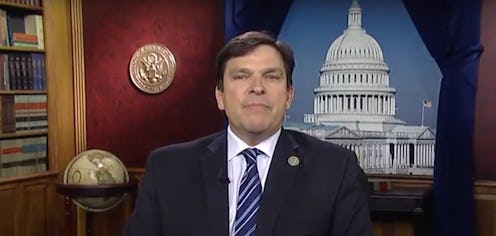News
A Congressman Fell For A Fake Story & Blamed The Texas Shooting On A Meme
A gunman shot and killed more than 20 people at the First Baptist Church in Sutherland Springs, Texas, on Sunday. In an interview with CNN later in the day, a Texas Congressman identified the Sutherland Springs shooter as Sam Hyde, saying that was the information he'd been "given." But though Hyde is indeed a real person, he wasn't the shooter in Sunday's massacre. He's actually an alt-right comedian, and for years, a segment of the Internet has gotten a kick out of falsely blaming him for mass shootings.
"It was reported to me that [the shooter is] actually not from this community," Rep. Vicente Gonzalez said on CNN. "Apparently, his name was released as 'Sam Hyde.' That's the name I was given."
Gonzalez, however, was misinformed. Hyde is actually an alt-right Internet personality, and he's become the subject of a running hoax that surfaces regularly after mass shootings: After mass shootings and other tragedies, some people on the Internet falsely claim that Hyde was the shooter.
It's unclear where this hoax originated or why those who spread it find it amusing, but it has endured for years, and the fact that a federal lawmaker mistook it for a real report is a crucial reminder to everyone of how important it is to verify information before spreading it to others — whether you're a congressperson or just an everyday citizen.
Just to be entirely clear, authorities have already identified the Sutherland Springs shooting suspect, and his name isn't Sam Hyde. The actual suspect was killed several miles away from the church after the attack; sources told KSAT that he took his own life, although officials haven't publicly confirmed this.
As for Hyde, he's one-third of a sketch comedy group that briefly had its own series on Adult Swim; that show was canceled after six episodes, however, after viewers and celebrities accused it of racism, homophobia and misogyny. A vocal supporter of Donald Trump, Hyde promoted the debunked pizzagate conspiracy theory on Twitter before his account was suspended, and donated $5,000 to neo-Nazi blogger Andrew Aglin's legal defense fund after Aglin, founder of the now-defunct Daily Stormer website, was sued for inciting harassment against Jewish women.
The Hyde hoax, as it were, is only one example of the kind of misinformation that so often spreads in the wake of tragedies.
Less than twelve hours after the Sutherland Springs shooter killed 27 people in Texas, BuzzFeed was able to document no fewer than six discrete pieces of false claims that circulated social media after the shooting. Some of them, such as a fake Facebook page purporting to be that of the shooter, were evidently spread with the intention of deceiving people, while other bits of misinformation were more likely the result of genuine miscommunication and confusion in the chaos of the tragedy.
That last part is important. In many cases, bad or false information about current events spreads not because a disreputable source knowingly sets out to deceive people, but simply due to honest confusion and mistakes. As a medium for the news, the Internet provides an endless, rapid-fire onslaught of information that's often easy to misinterpret, and it isn't uncommon for intelligent and well-intentioned people to pass along misinformation even when there's no malevolent intent by anybody involved. That's what happened in 2016 when, due to an honest mistake by Beyonce fans, celebrity chef Rachel Ray was inundated with hate mail intended for the similarly-named designer Rachel Roy.
Thankfully, that was a relatively inconsequential mistake, but it followed the same basic contours of the error Gonzales made with regard to the Sutherland Springs shooting. Gonzales didn't intend to spread a false claim, but that's precisely what he ended up doing when he cited Hyde as the shooter. Given that Hyde isn't particularly well-known in his own right, it was a mistake almost anybody could have made, which is why it's the exact kind of mistake that everybody needs to be cautious about making. Verify news before you pass it along, — and if you can't, don't pass it along.
